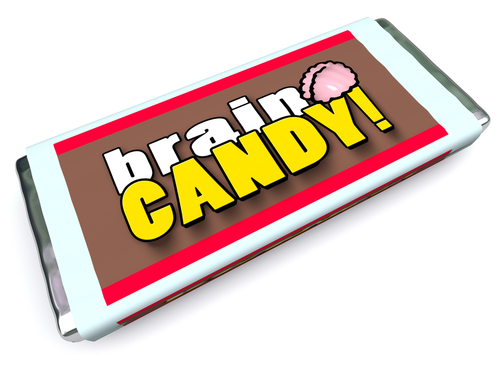…Is chemoinformatics the science of producing addictive food? Probably.
"Food is a whole new experience, man", is an expression that you might expect a hippie to make when referring to something like hallucinogenic magic mushrooms, and certainly not an approach you would expect to be adopted by the mainstream food industry. However, you might be wrong. If it is possible to identify the naturally occuring plant products that are mood enhancers or are responsible for feelings of well-being, then you are possibly onto a market winner. This is the field of opportunity exploited by a technology known as 'chemoinformatics', and the pressure is on to give your food product that addictive edge.
The substance valproic acid is a highly active (as well as potentially toxic) prescription anti-epileptic drug, and mood-stabiliser. It therefore comes as a bit of a surprise to learn that the substance is found in the naturally occurring food flavours of so-called comfort foods such as chocolate and foods containing omega 3 fatty acids.
Scientists from Torrey Pines Institute for Molecular Studies in California, USA analysed the substances that make up the flavours of common foods, the result of which was presented at the 244th National Meeting & Exposition of the American Chemical Society. They showed that some of the most common food flavours contained components similar to valproic acid. This strictly prescription only drug is sold under brand names that include Depakene, Depakote and Stavzor, which are used to smooth out the mood swings of people with manic-depressive disorder and related conditions.
USA analysed the substances that make up the flavours of common foods, the result of which was presented at the 244th National Meeting & Exposition of the American Chemical Society. They showed that some of the most common food flavours contained components similar to valproic acid. This strictly prescription only drug is sold under brand names that include Depakene, Depakote and Stavzor, which are used to smooth out the mood swings of people with manic-depressive disorder and related conditions.
The study involved the analysis of 1,700 ingredients that had similarities to approved antidepressants, marketed drugs and agents with reported antidepressant activity. The main result so far in the ongoing project involves valproic acid. In the future, the team plans to begin testing the flavour/mood hypothesis experimentally. The end result may be dietary recommendations or new nutritional supplements with beneficial mood effects.
"It is important to remember that just eating foods that may improve mood is not a substitute for prescribed antidepressive drugs," lead scientist Martinez-Mayorga cautioned. And for people not requiring medication, she notes that eating specific foods and living a healthy lifestyle can generally boost mood.
The scientists acknowledged funding from Robertet Flavors, Inc., and the State of Florida, Executive Officer of the Governor's Office of Tourism, Trade and Economic Development.



